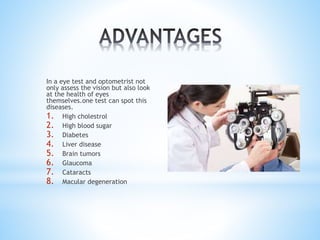Recognizing the Different Eye Conditions Dealt With by Specialized Eye Care Professionals
In the realm of eye treatment, specialized professionals play a vital function in identifying and treating a wide variety of eye problems. From typical refractive errors that influence vision clearness to age-related problems that present obstacles as we age, the knowledge of these specialists prolongs to taking care of vision-threatening conditions and complex corneal conditions. The complexities of neurological eye conditions present unique obstacles that necessitate specialized treatment. As we get started on this exploration of the different eye problems dealt with by specialized eye treatment experts, it ends up being evident that the complex internet of eye health holds a myriad of fascinating insights waiting to be revealed.
Common Refractive Errors
Refractive errors are common visual conditions triggered by a flaw in the eye's capacity to properly focus light, causing blurred vision. One of the most widespread kinds of refractive mistakes include myopia (nearsightedness), hyperopia (farsightedness), astigmatism, and presbyopia. Nearsightedness occurs when the eyeball is too lengthy or the cornea is as well rounded, creating far-off challenge appear blurred. Hyperopia, on the other hand, takes place when the eyeball is too short or the cornea is too flat, leading to close-by objects being out of emphasis. Astigmatism is defined by an irregularly shaped cornea, causing distorted or blurred vision whatsoever ranges. Presbyopia is an age-related problem where the lens sheds its adaptability, making it challenging to concentrate on close items.
These refractive errors can be corrected through various techniques, including eyeglasses, call lenses, or refractive surgical procedure. Eye care experts play an essential role in detecting and taking care of refractive errors to aid individuals accomplish more clear vision and enhance their lifestyle.
Age-Related Eye Problems
One of the most prevalent age-related eye problems is age-related macular deterioration (AMD), a disease that causes central vision loss and can make activities like analysis and driving difficult. Cataracts, another usual problem amongst older people, cause clouding of the eye's all-natural lens, leading to obscured vision. Routine eye exams with specialized eye treatment professionals are crucial for very early discovery and monitoring of these age-related eye conditions to preserve vision and maintain eye health as individuals grow older.
Vision-Threatening Conditions
Vision-threatening conditions encompass a series of serious ocular conditions that have the potential to considerably affect an individual's vision and overall visual function. These illness posture a risk of permanent vision loss otherwise quickly detected and dealt with by specialized eye treatment professionals. Some usual vision-threatening conditions include glaucoma, diabetic retinopathy, age-related macular deterioration (AMD), and retinal detachment.
Glaucoma is a team of eye problems that harm the optic nerve, often as a result of high intraocular stress, resulting in field of vision loss and prospective blindness if left untreated. Diabetic retinopathy is a difficulty of diabetes that influences capillary in the retina, creating vision disability or blindness. AMD is a progressive problem affecting the macula, like it causing main vision loss. Retinal detachment occurs when the retina separates from its underlying cells, leading to sudden vision loss that needs instant medical attention (refractive surgeries in al).
Very early discovery, routine eye exams, and additional hints timely treatment are vital in taking care of vision-threatening diseases to protect sight and keep top quality of life. Specialized eye care experts play a crucial function in diagnosing, dealing with, and handling these conditions to stop permanent vision loss.

Corneal Disorders
Corneal disorders incorporate a range of problems that impact the clear front component of the eye, recognized as the cornea. Treatment for corneal problems varies depending on the details condition however may consist of medicines, get in touch with lenses, or in extreme cases, corneal transplants. Normal eye exams are important for very early discovery and administration of corneal conditions to protect vision and eye health.
Neurological Eye Conditions
Neurological eye problems involve conditions that impact the connection in between the eyes and the brain, influencing aesthetic handling and general eye function. These problems can show up in different methods, influencing vision, eye movements, and also the control between the eyes. One common neurological eye condition is optic neuritis, identified by inflammation of the optic nerve leading to vision loss, color desaturation, and pain with eye motion.
Another significant condition is nystagmus, where the eyes make repeated, unchecked movements, impacting aesthetic acuity and deepness understanding. Furthermore, conditions like amblyopia, commonly described as "careless eye," result from uncommon visual advancement in early childhood, leading to minimized vision in one eye.
Neurological eye conditions call for specialized treatment from experts like neuro-ophthalmologists who have knowledge in both neurology and ophthalmology. Medical diagnosis frequently entails a thorough eye navigate here exam, imaging research studies, and cooperation with specialists to deal with the underlying neurological problems influencing the visual system. Therapy methods can include medication, vision treatment, or in severe situations, surgical interventions to manage these complex problems effectively.

Final Thought
To conclude, specialized eye care specialists deal with a vast array of eye conditions, including typical refractive errors, age-related eye conditions, vision-threatening diseases, corneal problems, and neurological eye conditions - refractive surgeries in al. By understanding these different problems and seeking ideal treatment from eye care experts, people can maintain optimum eye wellness and vision. It is necessary to prioritize routine eye evaluations and comply with suggested therapy plans to protect and protect one's vision for the future